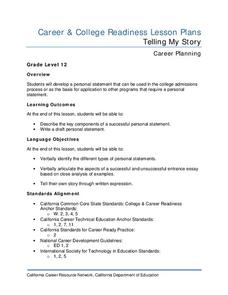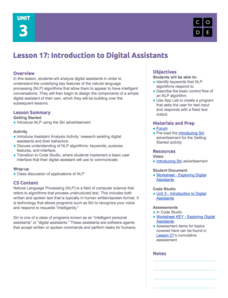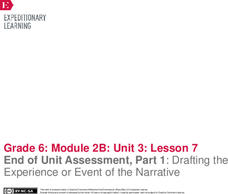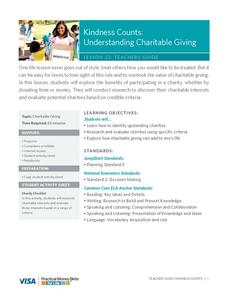Texas State Energy Conservation Office
Are Your Computers Wasting Energy?
After reading about the amount of energy that is used to power a personal computer, learners take a look at their own computer use and therefore, their energy consumption. They do this through a series of questions and computations on...
PBS
Code Creators
The lesson is real—even if the computer code isn't. Scholars learn about pseudocode, which simulates computer code using everyday language. They write pseudocode for simple actions, then have classmates guess the action from the written...
National Woman's History Museum
Getting with the Program
A seven-step lesson introduces the emergence of computer sciences and the contributions women made to the profession after World War II. Several science experiments offer pupils a hands-on learning experience that showcases parabolas,...
Positively Autism
"When I Feel Angry" Social Skill Story
Here's a presentation that shows kids appropriate ways to behave when they are feeling angry. They learn how to identify when they are feeling angry, calming strategies they can use, and words they can use to express their anger. The...
Code.org
HTTP and Abstraction on the Internet
Introduce your class to the layers of abstraction of the Internet with a instructional activity on the HTTP protocol. Pupils review previous lessons on levels of the Internet, then investigate new high levels by examining the...
Nemours KidsHealth
Online Safety: Grades 3-5
In two lessons all about online safety, scholars assist Nina in making smart decisions. First, they finish a speech started by the computer to detail why Nina's internet activity isn't safe and what she should do instead. Second,...
California Department of Education
Telling My Story
Entrance essays are the ultimate sales pitch! Show your seniors how to market themselves in the first of six college and career readiness lesson plans. Pupils discover the do's and don'ts of writing personal statements through research,...
Code.org
Identifying People with Data
How much information about you is out there? Scholars explore this question as they investigate data breaches and how these violations occur. They then take part in an activity where they research how easily people could get access to...
Code.org
Introduction to Digital Assistant Project
How does a computer recognize voice commands? Scholars learn about digital assistants and natural language processing (NLP) algorithms in the ninth lesson plan of the series. They begin building a simple digital assistant and work on...
American Battle Monuments Commission
Americans in Great Britain: 1942-1945
Watch the pivotal moments of America's presence in embattled Britain during World War II with an exceptional interactive tool. From personal stories about life on the front lines to a map that tracks every group and division...
NPR
Young And Brave Lesson Plan
Honor brave young women with a lesson that showcases 30 individuals who's achievements made a lasting impression on our country's history. Here, scholars randomly choose a person to examine from an interactive myseum exhibit then share...
Open Oregon Educational Resources
Beginning Excel
How can Microsoft Excel help manage data in people's personal and professional lives? Using the Beginning Excel eBook, scholars learn the basics of creating, editing, and using spreadsheets. They explore spreadsheet design, formulas,...
EngageNY
End of Unit Assessment, Part 1: Drafting the Experience or Event of the Narrative
Don't be tone deaf. Scholars study two photographs to better understand the concept of tone, so they can incorporate the literary device into their writing. Additionally, they draft the experience or event portion of their personal...
CK-12 Foundation
Systems of Linear Inequalities: Baking Cookies
Cook up a good resource for systems of linear inequalities. Using an interactive, individuals graph a system of linear inequalities to represent constraints on the number of cookies a person must bake. A set of challenge questions...
PBS
Stories of Painkiller Addiction: The Cycle of Addiction
Drug addiction, including prescription drug addiction, begins with a reason that's different for every user. High schoolers learn more about the reasons people begin abusing drugs with a set of videos and worksheets that discuss four...
University of Arkansas
Our Responsibilities
The fourth in a five-lesson unit examining human rights and personal responsibility asks class groups to investigate a current rights issue, and using the provided graphic organizer, summarize the issue, consider which rights are being...
Visa
Kindness Counts: Understanding Charitable Giving
Financial literacy is generally focused on personal spending and saving, but consider an opportunity to talk to your pupils about how charitable giving can also factor into money management and how it can enhance life for both...
Curated OER
Class Memory Book
Class members use digital cameras, computers, laser printers, and booklet making supplies to create their own page for a class memory book.
Chicago Botanic Garden
Calculating Your Carbon Footprint
Unplugging from technology for one day per week will decrease your carbon footprint—are you up to the challenge? Part two in a series of three allows individuals to explore their personal carbon footprints. By first taking a quiz at home...
Curated OER
Nonfiction Genre Mini-Unit: Persuasive Writing
Should primary graders have their own computers? Should animals be kept in captivity? Young writers learn how to develop and support a claim in this short unit on persuasive writing.
NPR
Lesson Plan: Trolls—Just Like You and Me?
Not all trolls hide under bridges; some of them hide behind computer screens! Learners explore the causes and effects of people leaving mean comments online. After learning vocabulary, watching and discussing a video, and responding to...
Teach Engineering
Processes on Complex Networks
Introduces your class to random processes in networks with an activity that uses information about disease spread using the susceptible, infectious, resistant (SIR) model. Participants determine whether a susceptible person becomes...
Nemours KidsHealth
Online Safety: Grades 9-12
Teach teens how to protect themselves from hackers, scammers, and online predators. First, class members examine their own digital footprints think critically about their online profile. Groups then generate lists of "do" and "don't do"...
English Enhanced Scope and Sequence
Media Literacy Applied
After investigating various forms of print, oral, and electronic media as sources of information, class members research a historical figure and produce a résumé for this person. While templates are provided for an initial sorting...























